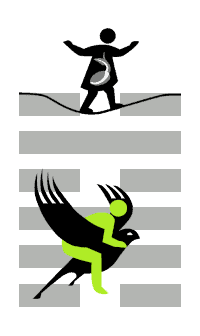The following case study is already somewhat older; it does not yet take into account the anthropological-psychological oriented theory of meaning Follow the Path of the Dao: A Western Approximation, which I developed and published in early 2022. Nevertheless, it shows quite well how the trigrams interlock and how to work with them.
Case Study
A user asks the I Ching about his entrepreneurial orientation and receives hexagram 48 – the Well several times (!). Specifically, his question concerns the criteria by which he should make future professional and business decisions. Should he focus on more conventional criteria (security, salary) or rather on his personal convictions (ethics, philosophy) and interests (development, innovation)?
Hexagram 48 – the Well begins with Sun, the wind / tree as the lower trigram. Sun represents a powerful, consistent emergence of possibilities. The user is thus offered a wide variety choices – and should use them for self-exploration in different situations. These can be conventional projects, but also ones that are more in line with his personal inclinations. He should pay close attention to the feedback from his environment (first core character; Dui, the lake). Questions such as “How is this project developing?”, “Which project is running smoothly, which one has major problems?”, “Which project seems lucrative at first glance, but now turns out to be disproportionately exhausting?”, “Which project will earn me less, but will open up new customer groups?”, “Which project makes me happy (and why)?” – can provide important clues.
Our culture has developed a fairly simple system to help us make choices: whatever brings more money is better, whoever has more money is more important, and the strongest wins anyway. And as long as we do not know what we really want in life we will be urged by the equally unconscious people around us to choose according to this simple system.
Unfortunately, the choices we make in this way often do not correspond at all to our own deepest convictions, our own spiritual roots. But this is precisely where the problem lies: what are our own, often unconscious roots?
There is actually a way to find out exactly where we stand, where our spiritual roots are: we just have to pay attention to the feedback that our environment gives us. We can draw fairly reliable conclusions about the unconscious parts of our being from this feedback, and our own inner self, our inner rooting, becomes visible to us through the mirror of our environment.
Li, the fire (second core character) refers to the ability to distinguish the clear from the unclear. In concrete terms, this means paying close attention to the development of individual projects. Over time, criteria will emerge that, when applied to our selection processes, will lead us to decisions that are truly in line with our nature. In the long run, our actions will be in harmony with our own roots (upper trigram; Kan, the water), strengthen our own rootedness and be sustainably successful. A self-reinforcing process.
The title of the hexagram, the Well, and also what is implied in the judgment, suggests that it may very well be possible at times to act contrary to our own deeply held beliefs (i.e. to undertake projects that are not 100% consistent with our own standards). However, this will not change our own roots / our deepest convictions (“The town may be changed, but the well cannot be changed.”). It’s only when we turn our backs on our own rooting that we run the risk of our roots cutting off our source of being – and that’s a really big disaster.
Further Questions on Hexagram 48
- One user asks: “Will I have a relationship with my first lover?”
- A user asks: “Why is it always me who listens and who gives – without ever being listened to, without getting anything in return?”
- One user asks: “Will my partner find his way back to me after the separation and can I be a positive part of his future? Because so far my strengths have not been recognized and I don’t feel integrated. Should I take more initiative – or should I let go?”
The current interpretation can be found here: https://www.no2do.com/hexagramme_en/877878.htm



